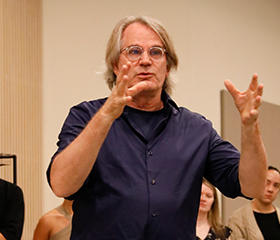Bartlett Sher, the director of McNeal, and I have had so many conversations for this blog over the years that we could have almost done our chat about Ayad Akhtar’s new play telepathically. But I’m pleased we didn’t, because Sher shared perspectives about McNeal I hadn’t fully considered.
I asked him to describe his initial response to reading the McNeal script. “I understood it to be,” he responded, “as Ayad has often described it: a classical tragedy. The play pursues the descent into tragedy – into Hell – of the title character, Jacob McNeal. That was the aspect that I immediately found interesting, compelling, dramatizable.”
The original purpose of tragedy, Sher continued, “was to create catharsis and transformation through the journeys of others.” Such catharsis, as Nietzsche commented in his seminal text, The Birth of Tragedy, is a “pain...that awakens pleasure.” In Akhtar’s drama, I hasten to inform potential McNeal theatergoers, the pleasure also includes plenty of wit, displayed in particular through the scenes between McNeal and his literary agent, Stephie. McNeal is portrayed by the magnificently versatile actor Robert Downey, Jr. and Stephie by one of New York’s ace adepts at comedy (and much else), Andrea Martin.
Whether tragic or comic, theater in ancient Greece quite literally meant an audience gathering on a hillside to watch a story unfolding below. “One of the great things about the Beaumont,” Sher observed – McNeal is running in LCT’s Vivian Beaumont space -- “is that it’s the closest you can get here in New York to a gathering on the hillside. Indoors, I mean. This space creates a community of connection.”
Ibsen, whose work is referenced in McNeal, once wrote about “the event underneath the event” -- the subtextual theme to a given story. I asked Sher what it was in the new Akhtar play. “There are at least two,” Sher replied. “The first involves contemporary shifts in our culture about who wields power. In the later section of McNeal, we have a vaunted white-male writer having a conversation with a young female African-American reporter. She tells him that she’d love to take him down. I think the relevant dynamic of that debate right now speaks for itself.”
According to Sher, McNeal’s second subtextual event involves Artificial Intelligence. “In the back of everyone’s minds, with the rapid change in technology, is a questioning of the very deep philosophical assumptions about how we intersect with these machines as they have more and more impact on our lives. That’s a conversation which audiences haven’t been able to have much in the theater, and we’re having it now with McNeal. That’s necessary and exciting.”
Brendan Lemon is a freelance journalist in New York.
